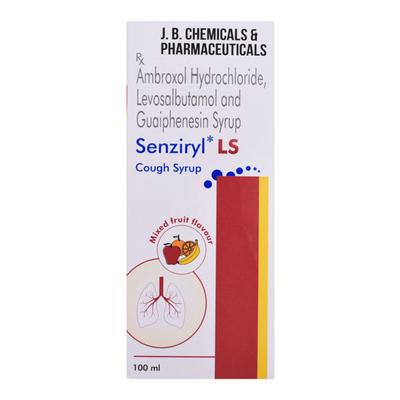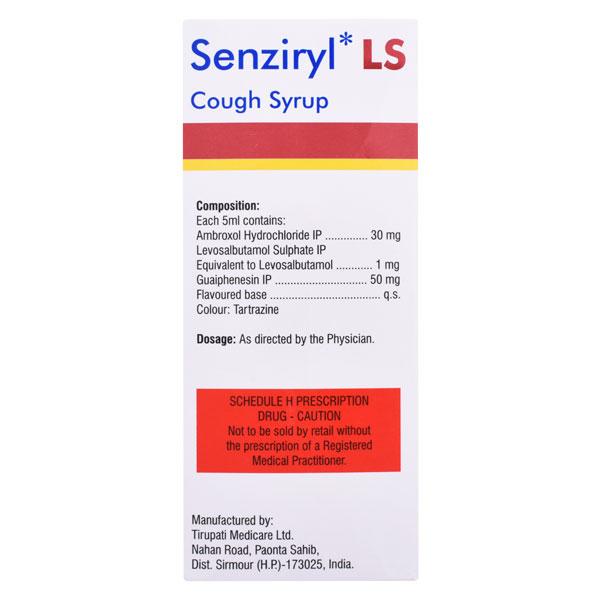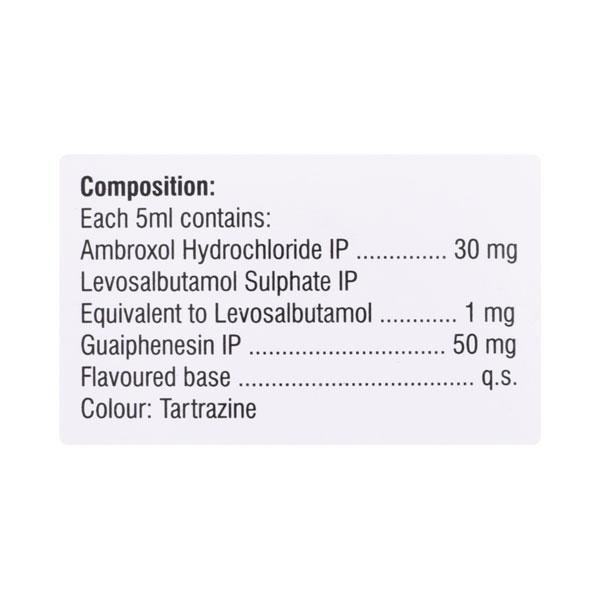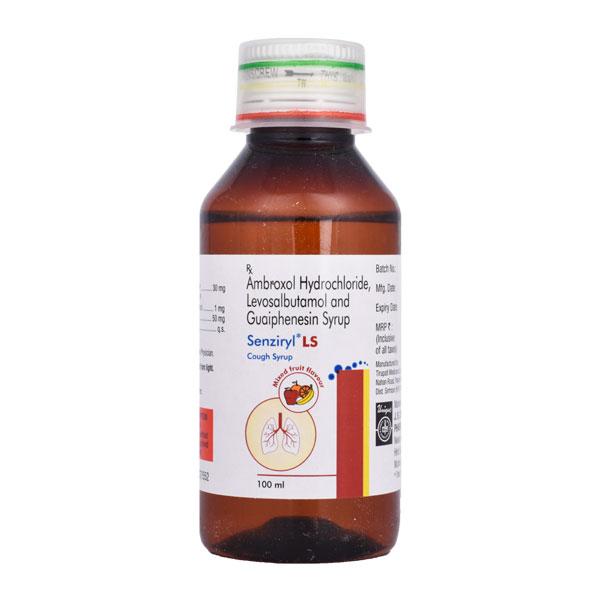

Netmeds First Membership
Quick Links
Introduction About SENZIRY LS SYRUP
SENZIRY LS SYRUP is used to manage productive cough associated with bronchospasm in conditions such as bronchitis and bronchial asthma as well as all conditions associated with tenacious mucus, wheezing and chest congestion. It contains Ambroxol, Guaiphenesin and Levosalbutamol which belong to the group of medicines called Mucolytics, Expectorants, and Bronchodilators. It lowers the phlegm thickness and makes it easier to cough out. It also relaxes the smooth muscle in the bronchial tubes, relieving shortness of breath or difficulty breathing.
It is recommended to take SENZIRY LS SYRUP with food. It is not recommended for use if you are allergic to Ambroxol, Guaiphenesin, and Levosalbutamol, have heart disease, or are at risk of heart attack, thyrotoxicosis, hereditary problems of fructose intolerance, or porphyria (a blood disorder). It should be given only if the potential benefit justifies the potential risk to the foetus. There are limited studies available for use during breast feeding in women.
The most common side effects are increased heart rate, dizziness, drowsiness, headache, nausea, vomiting, sweating. Consult your doctor if any of the side effects worsen.
Uses Of SENZIRY LS SYRUP
- It is used to manage productive cough associated with bronchospasm in conditions such as bronchitis and bronchial asthma as well as all conditions associated with tenacious mucus, wheezing and chest congestion
How SENZIRY LS SYRUP Works
SENZIRY LS SYRUP contains Ambroxol, Levosalbutamol and Guaiphenesin. Ambroxol is mucolytic, lowers the phlegm thickness, and makes it easier to cough out. Guaiphenesin is an expectorant that works by thinning the mucus in the airways to make it easier to cough up the mucus and make breathing easier. Levosalbutamol works by relaxing the smooth muscle in the bronchial tubes and relieving shortness of breath or difficulty breathing.
How to use SENZIRY LS SYRUP
- Take SENZIRY LS SYRUP as advised by your doctor
- Shake well before use
- Your doctor will decide the correct dose and duration for you depending on your age, condition, and body weight
Side Effects Of SENZIRY LS SYRUP
Common Side Effects of SENZIRY LS SYRUP:
- increased heart rate
- dizziness, drowsiness
- headache
- nausea, vomiting
- sweating
Stop taking SENZIRY LS SYRUP and inform your doctor immediately if you experience any of the following side effects:
- severe skin lesions such as Stevens-Johnson syndrome and toxic epidermal necrolysis (TEN, Lyell's syndrome)
Warning & Precautions
Pregnancy
Monitoring requiredSENZIRY LS SYRUP should be given only if the potential benefit justifies the potential risk to the foetus.
Breastfeeding
Consult your doctorThere are limited studies available for use during breastfeeding in women.
Driving and Using Machines
Use with CautionSENZIRY LS SYRUP may cause dizziness. Therefore, if you are affected by dizziness, do not drive or operate any machinery that requires your complete concentration.
Kidney
Use with CautionSENZIRY LS SYRUP should be used with caution in patients with kidney disease.
Liver
Use with CautionSENZIRY LS SYRUP should be used with caution in patients with liver disease.
Allergy
ContraindicatedDo not take SENZIRY LS SYRUP if you are allergic to Ambroxol, Guaiphenesin, Levosalbutamol, or to any of the other ingredients of this medicine.
Lungs
Use with CautionSENZIRY LS SYRUP should be used with caution in patients with acute severe asthma and in patients with symptoms of chronic impairment of mucus production.
Heart Disease
Consult your doctorSENZIRY LS SYRUP is not recommended for use in patients with heart disease or at risk of heart attack. It should be used with caution in patients with high blood pressure.
Use In Pediatrics
Consult your doctorYour doctor will prescribe the right dose depends on your child’s age, body weight and severity of the condition.
Use In Geriatrics
Consult your doctorClinical studies did not include sufficient numbers of subjects aged 65 years and older to determine whether they respond differently.
Others
SENZIRY LS SYRUP is not recommended for use if you:
- Have thyrotoxicosis
- Have hereditary problems with fructose intolerance
- Have porphyria
Before taking SENZIRY LS SYRUP, inform your doctor if you:
- Have uncontrolled juvenile diabetes mellitus
- Have hyperthyroidism
- Have seizures
- Have gastric ulcers
Interactions
A. Drug-Drug Interactions:
- Cardiac glycosides (Ex. digitalis, digoxin)
- Bronchodilators (Ex. aminophylline)
- Corticosteroids (Ex. prednisolone)
- Diuretics (Ex. furosemide)
- Sympathomimetic agent (Ex. epinephrine)
- Antidepressants (Ex. isocarboxazid, phenelzine, and imipramine)
- Beta-blockers (Ex. metoprolol)
- Antibiotics (Ex. amoxycillin, cefuroxime, and erythromycin)
- Analgesics and antipyretics (Ex. paracetamol)
Overdosage:
If you or anyone else accidentally takes too much SENZIRY LS SYRUP, consult your doctor immediately or visit the nearby hospital.
Synopsis
| Drug | : | Ambroxol, Guaiphenesin, Levosalbutamol |
| Pharmacological Category | : | Mucolytic, Expectorant, Bronchodilators |
| Therapeutic Indication | : | Productive Cough |
| Dosage Forms | : | Expectorant, Syrup |
FAQs About SENZIRY LS SYRUP
Q: What are the uses of SENZIRY LS SYRUP?
A: SENZIRY LS SYRUP is used to manage productive cough associated with bronchospasm in conditions such as bronchitis and bronchial asthma as well as all conditions associated with tenacious mucus, wheezing and chest congestion.
Q: How does SENZIRY LS SYRUP work?
A: SENZIRY LS SYRUP conta
Q: What are the uses of SENZIRY LS SYRUP?
A: SENZIRY LS SYRUP is used to manage productive cough associated with bronchospasm in conditions such as bronchitis and bronchial asthma as well as all conditions associated with tenacious mucus, wheezing and chest congestion.
Q: How does SENZIRY LS SYRUP work?
A: SENZIRY LS SYRUP contains three medicines, namely Ambroxol, Guaifenesin, Levosalbutamol. Ambroxol is mucolytic, lowers the phlegm thickness, and makes it easier to cough out. Guaifenesin is an expectorant that works by thinning the mucus in the airways to make it easier to cough up the mucus and make breathing easier. Levosalbutamol works by relaxing the smooth muscle in the bronchial tubes and relieving shortness of breath or difficulty breathing.
Q: How much SENZIRY LS SYRUP should be taken?
A: Take SENZIRY LS SYRUP as directed by your physician. Shake well before use. Your doctor will decide the correct dose and duration for your child depending on their age, body weight, and disease condition.
Q: What are the side effects of taking SENZIRY LS SYRUP?
A: The most common side effects of taking SENZIRY LS SYRUP are dizziness, drowsiness, headache, nausea, and vomiting. Consult your doctor if any of the side effects worsen.
Q: Can SENZIRY LS SYRUP be used during pregnancy?
A: SENZIRY LS SYRUP should be given only if the potential benefit justifies the potential risk to the foetus.
Q: What precautions must be taken while using SENZIRY LS SYRUP?
A: SENZIRY LS SYRUP should be used with caution in patients with kidney disease, liver disease, acute severe asthma, and in patients with symptoms of chronic impairment of mucus production and/or clearance, high blood pressure, or uncontrolled juvenile diabetes mellitus, hyperthyroidism, seizures, or gastric ulcers.
Q: Who should not take SENZIRY LS SYRUP?
A: SENZIRY LS SYRUP is not recommended for use if you are allergic to Ambroxol, Guaiphenesin, and Levosalbutamol, have heart disease, or are at risk of heart attack, thyrotoxicosis, hereditary problems of fructose intolerance, or porphyria (a blood disorder). Consult your doctor before taking it.
Q: Does SENZIRY LS SYRUP cause nausea or vomiting?
A: Yes, in some patients might cause vomiting, due to a bitter taste sensation. To avoid this, it can be mixed with fruit juice and consumed.
Q: Can I take other medicines along with SENZIRY LS SYRUP?
A: Before taking SENZIRY LS SYRUP, inform your doctor if you are taking, have taken, or might take any other medicine, including prescription, non-prescription, or any herbal medicine, as these might interact with each other and cause serious side effects.
References
1. KD. Tripathi. Drugs for cough and bronchial asthma. Essentials of Medical Pharmacology. Eighth Edition. 2019. Page – 238, 240.
2. Zaitsev AA, Leshchenko IV, Esaulova NA, Viktorova IA. [Evaluation of the efficacy and safety of a combination drug containing ambroxol, guaifenesin, and levosalbutamol versus a fixed-dose combination of bromhexine/guaifenesin/salbutamol in the treatment of productive cough in adult patients with acute bronchitis. [Accessed on 4th July 2024] click here
3. Centaur Pharma. Ambroxol+Guaiphenesin+Levosalbutamol. [Revised in January 2021] [Accessed on 4th July 2024] click here
4. Blue Cross Laboratories Pvt. Ltd. Ambroxol+Guaiphenesin+Levosalbutamol. [Revised in March 2021] [Accessed on 4th July 2024] click here
6. Cachet Pharmaceuticals Pvt. Ltd. [Revised on July 01, 2023] [Accessed on October 10th 2024] click here












